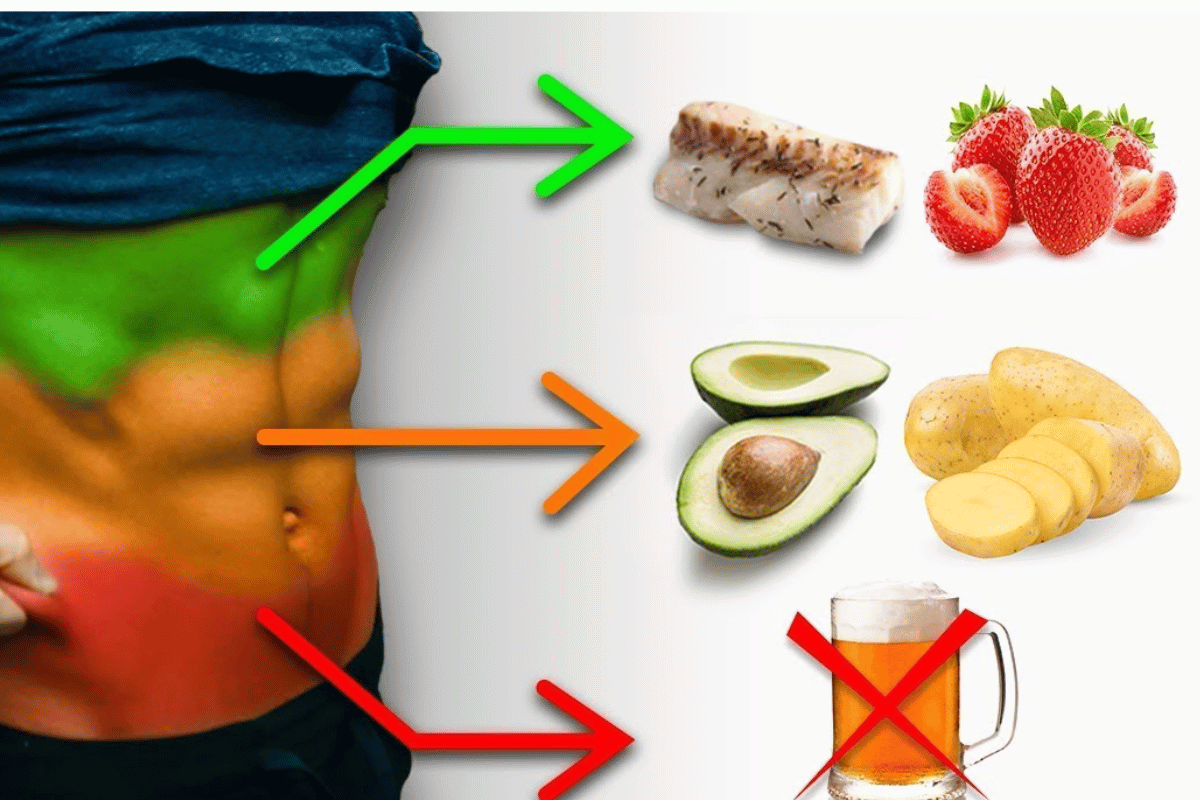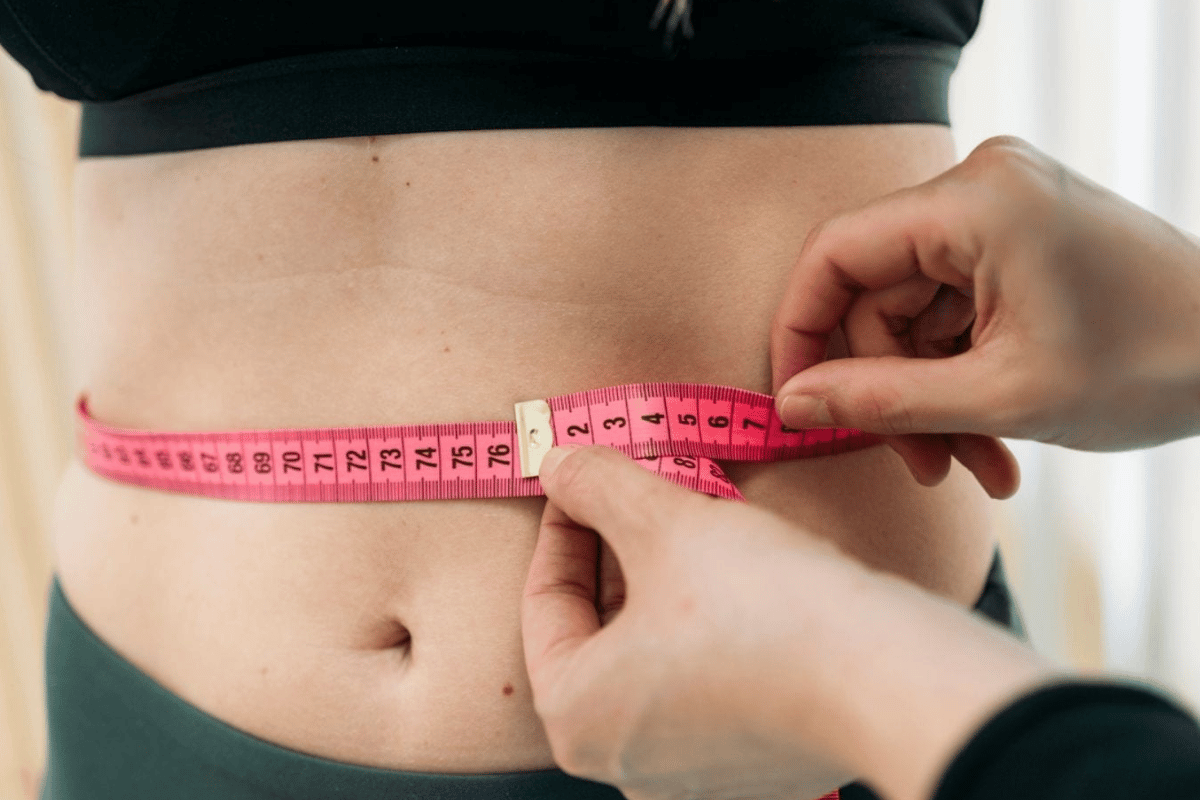In the wake of the holiday season, many people are looking to shed those extra pounds, especially around the belly area. In this article, we will explore effective strategies and tips to help you quickly and efficiently lose belly fat in 2024. Discover the key methods and lifestyle changes that can set you on the path to a slimmer and healthier you.
In the aftermath of the holiday season, it’s a common desire for many to embark on a journey of post-holiday wellness. One prevalent goal that often takes center stage is the determination to shed excess weight, particularly the stubborn fat around the belly area. As we usher in 2024, there’s an overwhelming sense of urgency and motivation to start the year on a healthier note. This article is dedicated to guiding you on how to efficiently and effectively lose belly fat, setting you on the path to improved health and boosted confidence.
The Belly Fat Dilemma
One of the most common concerns people have when it comes to weight management is the accumulation of belly fat. It’s essential to understand that not all fat is created equal. Belly fat can be categorized into two main types: subcutaneous fat, which lies just beneath the skin, and visceral fat, which surrounds the internal organs in the abdominal cavity.
The Health Risks
While subcutaneous fat may be relatively harmless, the real troublemaker is visceral fat. This deep-seated fat is associated with a host of health risks, including cardiovascular diseases, type 2 diabetes, and even certain types of cancer. Hence, the importance of addressing belly fat cannot be overstated.
Setting Achievable Goals
Before diving into the methods and strategies for losing belly fat, it’s crucial to establish realistic goals. Rapid weight loss is not always sustainable, nor is it necessarily healthy. Instead, we aim for steady progress that is achievable and maintainable over time.
A Preview of What Lies Ahead
In the sections that follow, we will delve into a comprehensive guide on how to quickly lose belly fat in 2024. We’ll explore nutrition and dietary choices that can facilitate fat loss. We’ll dive into exercise routines specifically designed to target the belly area. Lifestyle modifications, stress management, and adequate sleep will also play a significant role. Additionally, we’ll touch upon supplements and therapies that may aid in accelerating your progress. Lastly, we’ll discuss how to track your journey and stay motivated along the way.
So, without further ado, let’s embark on this journey towards a healthier, more confident version of yourself in 2024. It’s time to take control of your post-holiday wellness and bid farewell to that stubborn belly fat.

Understanding Belly Fat
To effectively lose belly fat, it’s crucial to understand the nature of the enemy we’re dealing with. Belly fat isn’t just a cosmetic concern; it’s a potential health hazard. This section will provide insights into the different types of belly fat and the health risks associated with its accumulation.
Types of Belly Fat
Belly fat can be classified into two primary categories: subcutaneous fat and visceral fat.
1. Subcutaneous Fat: This is the fat that lies just beneath the skin and is often responsible for the “soft” appearance of a protruding belly. While it’s visible and might affect your appearance, subcutaneous fat is generally considered less harmful than its counterpart.
2. Visceral Fat: Visceral fat is the more sinister of the two. It resides deeper within the abdominal cavity, surrounding vital organs such as the liver, pancreas, and intestines. It’s often referred to as “hidden fat” because it’s not visible from the outside. This type of fat is metabolically active and produces substances that can lead to chronic inflammation, insulin resistance, and an increased risk of heart disease and type 2 diabetes.
The Health Risks
Understanding the health risks associated with excess belly fat is crucial for motivation and long-term well-being. Here are some of the significant health concerns linked to belly fat:
1. Cardiovascular Diseases: Visceral fat produces inflammatory substances that can lead to atherosclerosis (hardening of the arteries) and an increased risk of heart disease.
2. Type 2 Diabetes: Belly fat is closely associated with insulin resistance, which can result in high blood sugar levels and the development of type 2 diabetes.
3. Hypertension: Excess visceral fat can lead to higher blood pressure, further increasing the risk of heart disease.
4. Certain Cancers: Some studies have shown an increased risk of developing certain types of cancer, such as colorectal cancer, in individuals with excess belly fat.
5. Fatty Liver Disease: Visceral fat can contribute to the accumulation of fat in the liver, leading to non-alcoholic fatty liver disease (NAFLD).
The Importance of Setting Achievable Goals
Before diving into the strategies for losing belly fat, it’s essential to set achievable goals. Rapid and drastic weight loss is not sustainable and can be detrimental to your health. Instead, focus on gradual and steady progress. Aim for a balanced and holistic approach that promotes long-term well-being.
Understanding the enemy is the first step in any battle, and in the quest to lose belly fat, knowledge is your most potent weapon. Armed with this understanding, we can now delve into the strategies and methods that will help you triumph in the battle against belly fat.
How to Quickly Lose Belly Fat
Now that we have a grasp of the importance of losing belly fat and the health risks associated with its accumulation, let’s delve into the strategies and methods that will help you shed those excess pounds efficiently. Losing belly fat requires a combination of dietary choices, physical activity, and lifestyle modifications. Here’s a comprehensive guide on how to achieve that goal:
The Role of Nutrition and Diet
Choosing the Right Foods
One of the most effective ways to lose belly fat is through a well-balanced diet. Opt for foods that support fat loss, such as:
- High-Fiber Foods: Fiber-rich foods like fruits, vegetables, whole grains, and legumes can help control hunger and reduce calorie intake.
- Lean Proteins: Incorporate lean protein sources like poultry, fish, tofu, and beans into your meals. Protein promotes feelings of fullness and aids in muscle preservation.
- Healthy Fats: Include sources of healthy fats, such as avocados, nuts, seeds, and olive oil. These fats can help regulate appetite and support overall health.
Portion Control
Watch your portion sizes, even when consuming healthy foods. Overeating, even with nutritious options, can lead to excess calorie intake and hinder your progress in losing belly fat.
Meal Planning
Plan your meals in advance to ensure you have access to wholesome options. This can help you avoid making poor food choices due to convenience.
Comprehensive Exercise Routines
Cardiovascular Workouts
Incorporate cardiovascular exercises into your routine to burn calories and promote overall fat loss. Activities like brisk walking, jogging, cycling, and swimming can help.
Strength Training
Engage in strength training exercises to build lean muscle mass. Muscle burns more calories at rest than fat, contributing to a higher metabolism. Include weightlifting, bodyweight exercises, or resistance bands in your regimen.
Core Exercises
Target your abdominal muscles with specific core exercises. These exercises, such as planks, leg raises, and crunches, can help strengthen your core and tighten the belly area.
Lifestyle Modifications
Stress Management
High stress levels can lead to the accumulation of visceral fat. Practice stress-reduction techniques such as yoga, meditation, or deep breathing exercises.
Prioritize Sleep
Aim for quality sleep of 7-9 hours per night. Inadequate sleep can disrupt hormones related to hunger and appetite, potentially leading to weight gain.
Stay Hydrated
Drinking enough water is crucial for overall health and can help control appetite. Sometimes, thirst is mistaken for hunger, leading to unnecessary calorie consumption.
Gradual Progress
Remember that losing belly fat is a gradual process. It’s unlikely to happen overnight, but with consistent effort, you’ll see results over time.
Seek Professional Guidance
If you have underlying medical conditions or are unsure where to start, consider consulting a healthcare professional or a registered dietitian. They can provide personalized guidance tailored to your needs.
Losing belly fat is achievable with commitment and the right strategies. By making informed dietary choices, engaging in regular physical activity, and implementing lifestyle modifications, you’ll be well on your way to achieving your goal of a flatter and healthier midsection.

Lifestyle Modifications
Apart from dietary choices and exercise routines, lifestyle modifications play a pivotal role in losing belly fat and achieving your wellness goals. The habits you adopt in your day-to-day life can significantly impact your progress. Let’s explore some crucial lifestyle adjustments that can help you shed belly fat efficiently:
Stress Management
Stress is more than just a mental burden; it can also contribute to the accumulation of belly fat. When you’re stressed, your body releases cortisol, a hormone that encourages fat storage, particularly around the abdominal area. To combat stress and its effects on your waistline:
- Practice Relaxation Techniques: Incorporate relaxation practices such as yoga, meditation, or progressive muscle relaxation into your daily routine. These techniques can help reduce stress levels and promote overall well-being.
- Prioritize Leisure Activities: Engage in activities you enjoy, whether it’s reading, painting, gardening, or spending time with loved ones. These activities can serve as a healthy distraction from stressors.
- Adequate Sleep: Ensure you get sufficient sleep each night. Sleep is essential for stress reduction and overall health. Aim for 7-9 hours of quality sleep to support your belly fat loss journey.
Hydration and Limiting Alcohol
Proper hydration is crucial for overall health and can aid in appetite control. Sometimes, the body confuses thirst with hunger, leading to unnecessary calorie consumption. To stay adequately hydrated:
- Drink Water Regularly: Carry a reusable water bottle with you throughout the day and sip on water consistently. This can help prevent dehydration and curb mindless snacking.
- Limit Alcohol Consumption: Alcohol can be calorie-dense and may contribute to belly fat. If you choose to consume alcohol, do so in moderation and be mindful of its impact on your overall calorie intake.
- Replace Sugary Beverages: Avoid sugary sodas and beverages, as they can add empty calories to your diet. Opt for water, herbal teas, or naturally flavored water alternatives.
Limiting Screen Time
Excessive screen time, whether it’s from computers, tablets, or smartphones, can lead to a sedentary lifestyle and increased snacking. To reduce screen-related weight gain:
- Set Screen Time Boundaries: Allocate specific time slots for screen-related activities and stick to them. Establishing boundaries can help you avoid mindless snacking while distracted.
- Incorporate Physical Activity: Whenever possible, engage in physical activities like stretching, walking, or light exercises during breaks from screens.
Social Support and Accountability
Seeking support from friends, family, or wellness groups can boost your motivation and accountability. Consider the following strategies:
- Share Your Goals: Let your close circle know about your wellness goals, including your desire to lose belly fat. Their encouragement and support can make a significant difference.
- Accountability Partners: Partner with a friend or family member who shares similar goals. Together, you can hold each other accountable and celebrate milestones.
- Join Online Communities: Online forums and communities dedicated to health and wellness can provide a sense of belonging and additional support.
By implementing these lifestyle modifications alongside your dietary and exercise efforts, you’ll create a well-rounded approach to losing belly fat and achieving post-holiday wellness. Remember that consistency and determination are key, and these changes can contribute to a healthier and more confident you.

Supplements and Therapies
In your quest to lose belly fat, you might consider supplements and therapies that could potentially accelerate your progress. While it’s essential to understand that these options are not magical solutions, they can complement a healthy diet and exercise routine when used cautiously and under professional guidance. Here’s a closer look at some of the supplements and therapies that have gained attention in the realm of belly fat reduction:
Supplements for Belly Fat Loss
1. Green Tea Extract
Key Component: Epigallocatechin gallate (EGCG)
How it may help: Green tea extract contains compounds like EGCG that are believed to boost metabolism and promote fat oxidation. While the effects on belly fat specifically may be modest, green tea can be a healthy addition to your diet due to its antioxidant properties.
2. Conjugated Linoleic Acid (CLA)
How it may help: CLA is a type of fat found in dairy products and beef. Some studies suggest that CLA supplements may help reduce body fat, including belly fat. However, results are mixed, and it’s essential to consult a healthcare professional before use.
3. Probiotics
How they may help: Gut health plays a role in weight management. Probiotics, often found in yogurt and supplements, may promote a healthier gut microbiome, potentially aiding in fat loss.
Therapies and Procedures
1. Liposuction
How it may help: Liposuction is a surgical procedure that suctions out fat from specific areas of the body, including the belly. While it can result in immediate fat reduction, it’s essential to maintain a healthy lifestyle afterward to prevent fat from returning.
2. CoolSculpting
How it may help: CoolSculpting is a non-invasive fat reduction procedure that freezes fat cells, causing them to die off and be naturally eliminated by the body. It’s an option for those looking to reduce localized belly fat without surgery.
3. Radiofrequency (RF) Treatments
How they may help: RF treatments use radiofrequency energy to heat and tighten the skin and underlying tissues, potentially reducing the appearance of belly fat and improving skin elasticity.
Important Considerations
While supplements and therapies offer potential benefits, it’s crucial to approach them with caution:
- Consult a Healthcare Professional: Before starting any supplements or therapies, consult a healthcare provider to assess their suitability for your individual circumstances.
- Potential Side Effects: Some supplements and therapies may have side effects or interact with medications you’re currently taking. Your healthcare provider can advise on potential risks.
- Not a Substitute: Remember that supplements and therapies are not a substitute for a balanced diet and regular exercise. They should complement, not replace, a healthy lifestyle.
- Long-Term Approach: Effective and sustainable belly fat loss requires a long-term approach. While these options may provide short-term results, they should be part of a broader wellness plan.
Incorporating supplements or therapies into your belly fat loss journey should be a well-informed decision guided by healthcare professionals. It’s essential to prioritize safety, and any approach you choose should align with your overall health and wellness goals.

Tracking Progress and Staying Motivated
Achieving your goal of losing belly fat requires not only the right strategies but also the motivation and commitment to stay on course. In this section, we’ll explore how to track your progress effectively and maintain the motivation needed to reach your wellness objectives.
Monitoring Your Progress
1. Keep a Journal
Maintaining a journal can be a powerful tool in your journey to lose belly fat. Record your daily meals, exercise routines, and any challenges you encounter. This helps you identify patterns, triggers for overeating, and areas where you can improve.
2. Measure Waist Circumference
Tracking changes in your waist circumference is a reliable way to monitor belly fat loss. Use a tape measure to measure your waist at the level of your navel. Regular measurements can provide a tangible sense of progress.
3. Take Progress Photos
Visual evidence can be incredibly motivating. Take photos of your midsection from multiple angles at regular intervals. Over time, you’ll be able to compare these photos to gauge your progress.
Staying Motivated
1. Set Realistic Milestones
Break your long-term goal of losing belly fat into smaller, achievable milestones. Celebrate each milestone you reach, whether it’s a certain number of pounds lost or an improvement in your waist circumference.
2. Find an Accountability Partner
Share your goals with a friend or family member who can serve as an accountability partner. Having someone to check in with and share your successes and challenges can help maintain motivation.
3. Reward Yourself
Treat yourself to non-food rewards for reaching specific milestones. It could be a spa day, a new book, or any other item or experience that motivates you.
4. Join a Support Group
Consider joining a support group or community focused on wellness and belly fat loss. Sharing experiences and tips with like-minded individuals can provide valuable encouragement.
5. Adjust Goals as Needed
Stay flexible with your goals. If you encounter obstacles or changes in your circumstances, be willing to adjust your approach while keeping the ultimate objective in mind.
6. Visualize Success
Spend a few minutes each day visualizing your success. Imagine yourself with a toned midsection, feeling healthy and confident. Visualization can reinforce your commitment.
The Importance of Support
Don’t hesitate to seek support from friends, family, or wellness professionals when needed. Sometimes, a little encouragement or guidance can make a significant difference in staying on track.
Remember that the journey to lose belly fat is not always linear. There may be periods of slower progress or occasional setbacks. What matters most is your commitment to long-term well-being and a healthier lifestyle.
As you track your progress and stay motivated, keep in mind that achieving post-holiday wellness is about more than just losing belly fat. It’s about embracing a holistic approach to health that encompasses physical and mental well-being. By staying dedicated and focused, you can achieve your goals and enjoy the benefits of a healthier, more confident you.

Conclusion
In conclusion, embarking on a journey to lose belly fat is a commendable endeavor, and it can have a significant impact on your overall health and well-being. As we wrap up our discussion on post-holiday wellness and shedding those extra pounds, let’s recap some key takeaways:
The Holistic Approach
Achieving your goal of losing belly fat quickly in 2024 involves adopting a holistic approach to wellness. It’s not just about aesthetics; it’s about enhancing your overall health and quality of life.
Understanding Belly Fat
Before you can effectively lose belly fat, it’s essential to understand its different types and the potential health risks associated with its accumulation. Both subcutaneous and visceral fat can impact your well-being, making their reduction a valuable pursuit.
Strategies for Success
To quickly lose belly fat, you need a combination of strategies:
- Nutrition: Focus on a balanced diet rich in fiber, lean proteins, and healthy fats. Watch portion sizes and plan your meals thoughtfully.
- Exercise: Incorporate cardiovascular workouts, strength training, and core exercises into your routine to maximize fat burning and muscle building.
- Lifestyle Modifications: Manage stress, prioritize sleep, and stay hydrated. These lifestyle factors can significantly impact belly fat accumulation.
- Supplements and Therapies: Consider supplements and therapies cautiously, consulting healthcare professionals for guidance.
Tracking Progress
Monitoring your progress through journaling, measuring waist circumference, and taking progress photos can help you stay motivated and on track.
Staying Motivated
Maintaining motivation is crucial on your belly fat loss journey. Set realistic milestones, find accountability partners, and reward yourself for your achievements. Visualization and flexibility in your goals are also key to success.
Seek Support
Don’t hesitate to seek support from friends, family, or wellness professionals when needed. Support can provide valuable encouragement and guidance.
A Healthier, More Confident You
Remember that the ultimate goal of losing belly fat is not just about physical appearance; it’s about becoming a healthier and more confident version of yourself. Embrace this journey as an opportunity for self-improvement and long-term well-being.
As you embark on your post-holiday wellness journey in 2024, keep these principles in mind. With commitment, dedication, and a holistic approach, you can achieve your goal of losing belly fat and enjoy the many benefits of improved health and confidence. Here’s to a successful and fulfilling wellness journey!
Frequently Asked Questions (FAQ) – Lose Belly Fat
1. What causes excess belly fat?
Excess belly fat can be caused by various factors, including poor dietary choices, sedentary lifestyle, genetics, hormonal changes, and stress. It often results from an imbalance between calorie intake and expenditure.
2. Can I target belly fat specifically with exercises?
While specific exercises can strengthen the abdominal muscles and improve the appearance of your midsection, spot reduction of belly fat is challenging. Effective fat loss generally requires a combination of cardiovascular exercise, strength training, and a balanced diet.
3. How can I lose belly fat quickly and safely?
To lose belly fat quickly and safely, focus on a holistic approach:
- Adopt a balanced diet with fewer processed foods and added sugars.
- Incorporate regular exercise, including both cardiovascular and strength training.
- Prioritize sleep, manage stress, and stay hydrated.
- Consider seeking guidance from healthcare professionals or registered dietitians.
4. Are there foods that help with belly fat loss?
Certain foods can support belly fat loss, including:
- High-fiber foods like fruits, vegetables, and whole grains.
- Lean proteins like chicken, fish, and legumes.
- Healthy fats found in avocados, nuts, and olive oil.
- Foods rich in antioxidants, such as berries and leafy greens.
5. Can supplements help in losing belly fat?
Some supplements may aid in belly fat loss, but they should be used cautiously and under professional guidance. Green tea extract, conjugated linoleic acid (CLA), and probiotics are among the supplements that have shown potential benefits.
6. How long does it take to see results in losing belly fat?
The timeline for seeing results in losing belly fat can vary based on individual factors like genetics, starting weight, and adherence to a healthy lifestyle. Some individuals may notice changes within weeks, while for others, it might take months of consistent effort.
7. Is belly fat associated with health risks?
Yes, excess belly fat, especially visceral fat (fat stored around organs), is linked to various health risks, including heart disease, type 2 diabetes, and certain cancers. Reducing belly fat can have a positive impact on your overall health.
8. What are the benefits of losing belly fat?
Losing belly fat offers several benefits:
- Reduced risk of chronic diseases.
- Improved metabolic health.
- Increased energy levels.
- Enhanced self-confidence.
- Better overall physical and mental well-being.
9. Can I lose belly fat without exercise?
While exercise can accelerate belly fat loss, it’s possible to make progress with dietary changes alone. However, a combination of both exercise and a balanced diet is generally more effective for achieving long-term results.
10. How can I stay motivated on my journey to lose belly fat?
Staying motivated involves setting realistic goals, seeking support from friends or a support group, celebrating milestones, and visualizing success. Keeping track of your progress through measurements and photos can also boost motivation. Remember that setbacks are a normal part of the journey, and consistency is key to success.
Lose Belly Fat
References and Further Reading
- Grundy, Scott M. “Obesity, Metabolic Syndrome, and Cardiovascular Disease.” Journal of Clinical Endocrinology & Metabolism, vol. 89, no. 6, 2004, pp. 2595-2600.
- Harvard Health Publishing. “Abdominal Fat and What to Do About It.” Harvard Health Letter, Harvard Medical School, July 2021.
- Jensen, Michael D., et al. “Measurement of abdominal and visceral fat with computed tomography and dual-energy x-ray absorptiometry.” The American Journal of Clinical Nutrition, vol. 61, no. 2, 1995, pp. 274-278.
- Mozaffarian, Dariush, et al. “Changes in Diet and Lifestyle and Long-Term Weight Gain in Women and Men.” New England Journal of Medicine, vol. 364, no. 25, 2011, pp. 2392-2404.
- Poirier, Paul, et al. “Obesity and Cardiovascular Disease: Pathophysiology, Evaluation, and Effect of Weight Loss.” Arteriosclerosis, Thrombosis, and Vascular Biology, vol. 26, no. 5, 2006, pp. 968-976.
- Raynor, Hollie A., et al. “Position of the Academy of Nutrition and Dietetics: Interventions for the Treatment of Overweight and Obesity in Adults.” Journal of the Academy of Nutrition and Dietetics, vol. 116, no. 1, 2016, pp. 129-147.
- St-Onge, Marie-Pierre, and Aubrey Shechter. “Sleep disturbances, body fat distribution, food intake and/or energy expenditure: Pathophysiological aspects.” Hormones, vol. 15, no. 3, 2016, pp. 193-203.
- Tchernof, André, and Jean-Pierre Després. “Pathophysiology of Human Visceral Obesity: An Update.” Physiological Reviews, vol. 93, no. 1, 2013, pp. 359-404.
- Villareal, Dennis T., et al. “Weight Loss, Exercise, or Both and Physical Function in Obese Older Adults.” New England Journal of Medicine, vol. 364, no. 13, 2011, pp. 1218-1229.
- Wing, Rena R., and Suzanne Phelan. “Long-term weight loss maintenance.” The American Journal of Clinical Nutrition, vol. 82, no. 1, 2005, pp. 222S-225S.
Related Posts :
- En Zion Williamson Weight Loss How Zion Williamson Transformed For The 2024 25 Nba Season Qo65
- En Miamis Fitness Secret Women Achieving Flatter Stomachs In Just 2 Weeks Keto Pills Reviews Exposed Rfs9
- En Unbiased Simpli Acv Keto Gummies Reviews Z9ai
- Keto X Active Review Can This Supplement Really Accelerate Your Keto Weight Loss 6mly
- En Healthy Smoothies Recipes To Lose Weight Qu83

